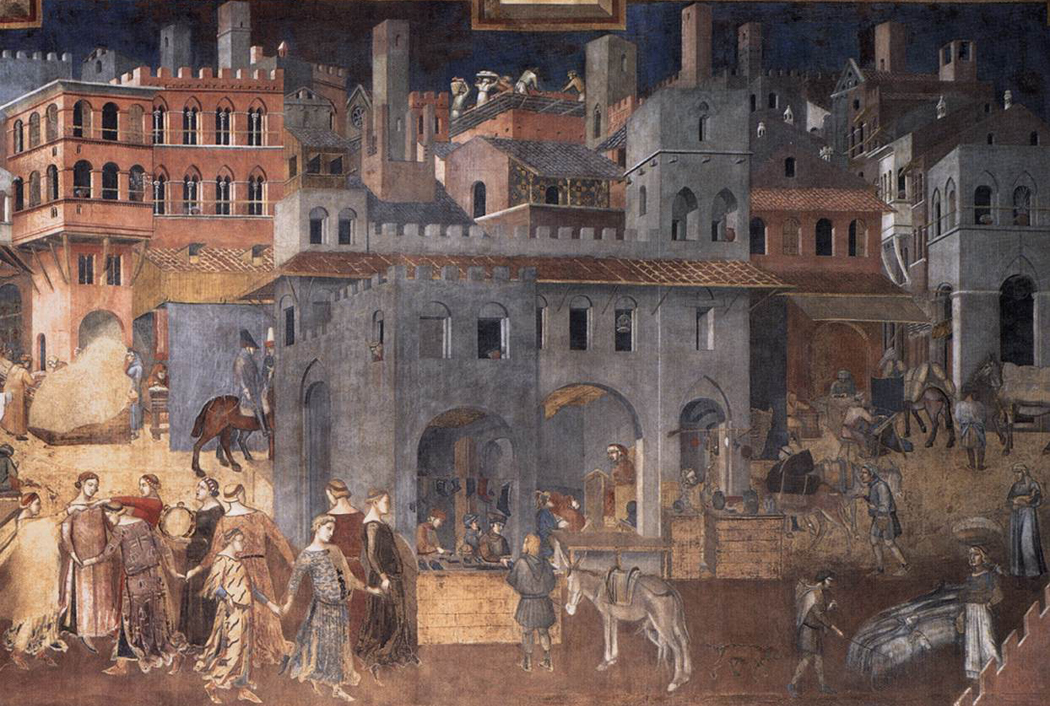‘Reform and Renewal’ are the key-words chosen to inspire participants in this year’s International Medieval Congress at Leeds. But don’t be mistaken: it is all about the “Material Turn”!
The thematic strand at this year’s International Medieval Congress 2015 is called: Reform and Renewal. This theme has – according to the organisers – been chosen ‘for the crucial importance of both phenomena in social and intellectual discourse, both medieval and modern, as well as their impact on many aspects of the human experience’.
When launched some people bickered a bit! And to be fair, it did sound somewhat like an empty slogan for a 21st century political campaign dreamed up in Hobbinton by the Sackville-Bagginses while Bilbo was out questing. What has come out of it, though, is something quite different.
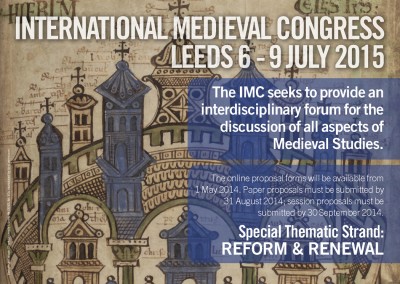 This becomes apparent by looking at the 220 sessions prepared inside the ‘strand’ (the numbers refers to the number of sessions inside each sub-theme)
This becomes apparent by looking at the 220 sessions prepared inside the ‘strand’ (the numbers refers to the number of sessions inside each sub-theme)
- Artistic Expressions [12]
- Cross-Cultural Perspectives [9]
- Dissidence [15]
- Early Medieval Reforms [10]
- Ethical and Spiritual [15]
- Late Medieval Religious Reform [23]
- Literary Expressions [14]
- Medieval Historiographers’ Views [15]
- Post-Medieval Perspectives on Reform [13]
- Reforming Knowledge [14]
- Reforming Secular Powers [14]
- Reforming Society [19]
- Ritual and Spatial [10]
- Secular Reform in the Later Middle Ages [13]
- The Age of Reform, c. 1050-1250 [24]
Of all these a mere 6% of sessions explicitly fall into the category of literature, while the rest of the literary papers have been “packed” together with lots of more papers touching upon the history proper of reception and impact. This is not a conference where youngsters get brownie points for archly asking the perennial question of whether there is a text in this class or not! Instead credit is obviously awarded to those, who take the practical and material side of things in earnest.
For instance there are five sessions, which will focus on ‘Wycliffe, Hus and the Impact of Reform’. Given the overarching theme, this is not at all odd in a year, when we commemorate the 600 anniversary of the Council in Constance. What is apparent, though, is that scholars, who might be interested in the theological issues at stake, run the risk of being somewhat disappointed. Instead keywords like transmission, cultural context, intellectual setting, social impact and the reaction of power centres flourish in the abstracts.
Places and Spaces
The same practical sense seems to have guided the organisers while choosing the plenary lecturers.
Maureen C. Miller, who is professor at the department of History at Berkeley, gives the first plenary lecture, titled ‘ Beyond National Narrative: Culture, States, and Reframing ‘Gregorian Reform’. Aha, says the medievalist, who is primarily interested in the more ephemeral ideas of the Middle Ages. Not so, however. Aficionadas of the work of Maureen Miller will know her from her very practical inquiries into both the palaces of bishops and the distinctive garb of ministers in the medieval church. In her presentation, she promises to argue that ‘the significance of the intense reform efforts of the late 11th and early 12th centuries lies chiefly in the creation of a European-wide clerical culture and of new forms of territorially complex states’. Obviously this is a pertinent perspective of both places and spaces at a time, when Europe is hastily splintering into weird neo-nationalist fragments.
The second lecture is presented by Keith Lilly, who is Reader in Historical Geography in Belfast at Queen’s. Here is a man, who knows his medieval town both in England and abroad. His paper is titled ‘Spaces of Reform?: Urban Renewal and the Shaping of Cities in Medieval Europe’. In this, he promises to explore the concept of ‘reform’ by ‘thinking through its spatial dimensions and its manifestations in the material renewal of urban fabric in medieval cities across Europe. As must be obvious, this is not a presentation, which will be possible without the use of slides and powerpoint.
The Material Turn in Medieval Studies
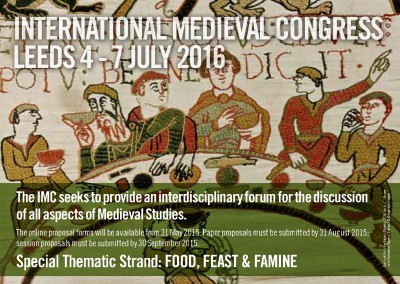 It is apparent that both these lectures fall squarely into the paradigm of the material turn. Originally this was a paradigmatic shift engendered by archaeology and anthropology, rediscovering their roots at a time when ‘cultural studies’ was getting all the flak for being totally postmodern (and un-readable). As usual, though, it took some time to enter the fields of Medieval History and Medieval Studies, although the work of Ladurie, Le Goff and other historians, who inherited the Annales School, seemed to clear the path for proper Historical Anthropological studies of the Middle Ages. As we all know, that took off inside Early Medieval History, not least thanks to the group from Bucknell and later Woolstone (Davies, Wormald, Reuter, Nelson, Fouracre, Ganz, Wood, Wickham an Morris etc.). However, it was a late start inside the scholarly field of Medieval Studies, partly because American Medievalists kept on delving into their Arthurian pet-projects. And still does: At Kalamazoo this spring, eleven sessions include presentations of Arthurian Studies; at Leeds, only six. Even more to the point, there are thirty-three sessions in Kalamazoo featuring presentations on this or that aspect of Chaucer’s work. At Leeds there are only six!
It is apparent that both these lectures fall squarely into the paradigm of the material turn. Originally this was a paradigmatic shift engendered by archaeology and anthropology, rediscovering their roots at a time when ‘cultural studies’ was getting all the flak for being totally postmodern (and un-readable). As usual, though, it took some time to enter the fields of Medieval History and Medieval Studies, although the work of Ladurie, Le Goff and other historians, who inherited the Annales School, seemed to clear the path for proper Historical Anthropological studies of the Middle Ages. As we all know, that took off inside Early Medieval History, not least thanks to the group from Bucknell and later Woolstone (Davies, Wormald, Reuter, Nelson, Fouracre, Ganz, Wood, Wickham an Morris etc.). However, it was a late start inside the scholarly field of Medieval Studies, partly because American Medievalists kept on delving into their Arthurian pet-projects. And still does: At Kalamazoo this spring, eleven sessions include presentations of Arthurian Studies; at Leeds, only six. Even more to the point, there are thirty-three sessions in Kalamazoo featuring presentations on this or that aspect of Chaucer’s work. At Leeds there are only six!
This is not to say that the Americans have totally overlooked the ‘material turn’. One should of course mention the work of Caroline Walker Bynum (Emerita, Princeton), Daniel Lord Smail (Harvard), Aden Kumler (Chicago) and Jessica Brantley (Yale). And at the upcoming conference at Kalamazoo there are indeed a number of sessions and presentations, which does touch upon the materiality of bodies, liturgies and other performances (for instance by Sara Ritchey). Nevertheless there is a distinct whiff around the Americans signalling their status as late-comers to this particular party. Perhaps this becomes especially apparent, when we take note of the fact that Sara Lipton (New York) is sponsored by The Medieval Academy to go Leeds to talk about about: ‘The Vulgate of Experience – Preaching, Art, and the Material World’. She is absent from the programme at Kalamazoo this year, although she sits on the planning committee (which may of course be the reason!)
Perhaps the Medieval Academy will gear up next year? Until then, the competition in Leeds is already preparing yet another feast for 2016 – this time on even more material matters such as Food, Feast and Famine.
Or maybe Kalamazoo is where we may discover what the next ‘big thing’ is all about? Their focus this year is definitely on ‘Ethics’.
Karen Schousboe
SOURCE:
International Medieval Congress 2015 – University of Leeds
READ MORE:
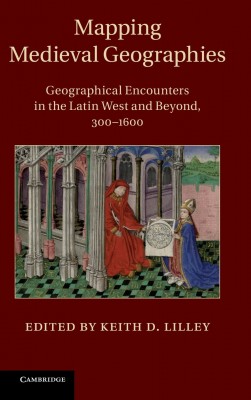 Mapping Medieval Geographies: Geographical Encounters in the Latin West and Beyond, 300–1600
Mapping Medieval Geographies: Geographical Encounters in the Latin West and Beyond, 300–1600
By Lilley K D (ed.)
Cambridge University Press 2013
ISBN 978 1 10703 691 8
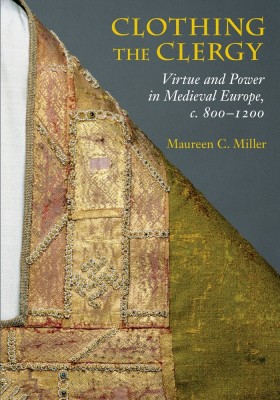 Clothing the Clergy. Virtue and Power in Medieval Europe, ca. 800 – 1200
Clothing the Clergy. Virtue and Power in Medieval Europe, ca. 800 – 1200
By Maureen C. Miller
Cornell University Press 2014
ISBN-10 0801449820
ISBN-13 978-0-8014-4982-6
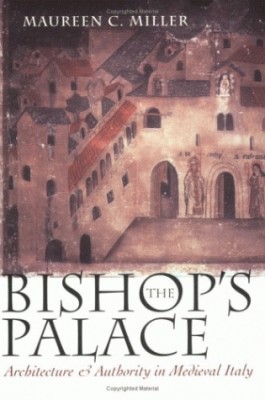 The Bishop’s Palace. Architecture and Authority in Medieval Italy
The Bishop’s Palace. Architecture and Authority in Medieval Italy
Maureen C. Miller
Cornell University Press 2002
ISBN-10 0-8014-3535-8
ISBN-13 978-0-8014-3535-5
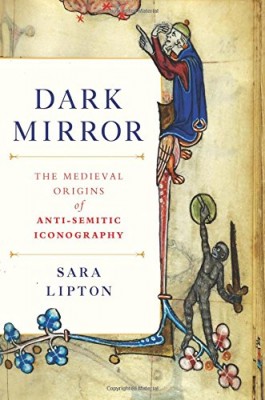 Dark Mirror: The Medieval Origins of Anti-Jewish Iconography
Dark Mirror: The Medieval Origins of Anti-Jewish Iconography
by Sara Lipton
Metropolitan Books 2014
ISBN-10: 0805079106
ISBN-13: 978-0805079104
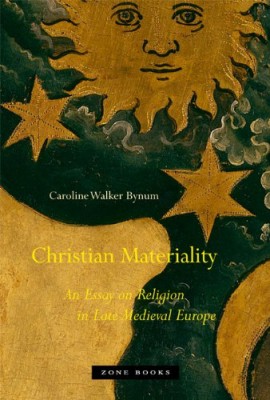 Christian Materiality. An Essay on Religion in Late Medieval Europe.
Christian Materiality. An Essay on Religion in Late Medieval Europe.
By Caroline Walker Bynum
Zone Books 2011
ISBN-10: 1935408100
ISBN-13: 978-1935408109
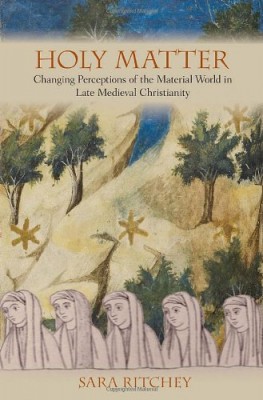 Holy Matter: Changing Perceptions of the Material World in Late Medieval Christianity
Holy Matter: Changing Perceptions of the Material World in Late Medieval Christianity
by Sara Ritchey
Cornell University Press 2014
ISBN-10: 0801452538
ISBN-13: 978-0801452536
